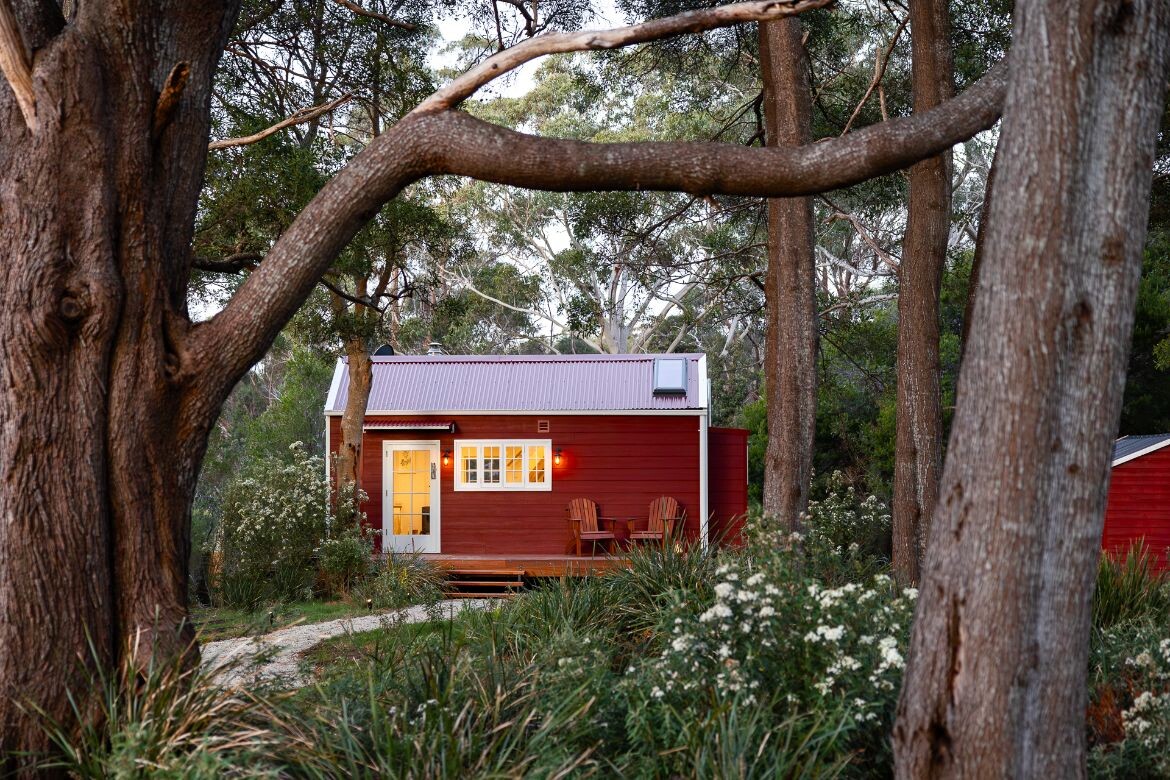Michael and Maša Ofei are a husband-and-wife duo based in Launceston, Tasmania. With a shared passion for minimalism and interest in tiny house living, the couple dreamed of creating a Swedish-inspired experience on a piece of land in Tasmania.
At the intersection of innovation and communication, Michael and Maša embraced the ever-evolving landscape of the digital age for their project, Little Falu – which is now ready to take guests as a tiny house accommodation. Leveraging platforms like Instagram and Pinterest, they effortlessly communicated their design vision to builders, bypassing the traditional requirement for a designer or architect. Drawing on their experience running websites, including Heartful Table and The Minimalist Vegan, the couple’s tech-savvy approach showcased their adaptability and modern approach to managing projects.
“On his birthday in 2022, Michael showed me a beautiful block of land online that was for sale just down the road from where we were having lunch in the historic town of Sheffield. We went to look at it and started dreaming up what we would do with it. We found out later that day that it was already sold, but it got us thinking about what else was out there,” says Maša, co-owner of Little Falu, adding, “We have such creative minds and some crazy ideas at times, so we kept an eye out for months for an affordable piece of land around the state. Our place came up for sale a few months later, and we immediately fell in love with it.”
The objective of the brief was to design a tiny house with the appeal of a classic Nordic cottage, taking cues from influential Swedish design with features like wallpapers and muted green kitchens. The challenge was to amalgamate modern interior design while preserving traditional external features.
A smaller scale residence – Little Falu extends over a length of six metres – required a floorplan layout that maximised the use of limited space efficiently. The tiny house features an open living area comprised of a large window lounge, a small fireplace and half steps leading up to the loft.
To capture the aesthetic of a Swedish-inspired tiny home while maximising the available space it was essential to incorporate the pitched roof internally. Although the loft is intimate, the display of a subtle floral patterned feature wall and two skylights creates an impression of openness. Crafted by a Hobart-based joiner, the custom windows contribute to the home’s ambience by maximising natural light — a design principle synonymous with Nordic housing. This emphasis on natural light is achieved without sacrificing the exterior aesthetics.
Tonally in tune with the Nordic holiday aesthetic, the kitchen showcases Tasmanian Oak benchtops, pistachio green cupboards, and a full-sized oven. The incorporation of a deck extension brings added living space, adorned with two Adirondack chairs crafted by the local men’s shed.
The Scandinavian influence prevails with outdoor features including tiered garden beds, a gravel fire pit area and a small patch of grass, for intimate moments spent outside.
Situated in an Australian bush block characterised by a high-fire-risk profile and flourishing wildlife, the need for compliance with strict bushfire ratings prompted a thoughtfully curated selection of fauna, ensuring harmony with the envisioned flower forest aesthetic while protecting against potential harm from the wildlife.
Amid these considerations, the construction faced a major challenge when it was found that the surrounding terrain hindered the installation of crucial waste management and drainage systems.
The challenges unfolded alongside the complexity of securing council approval for the tiny home, which introduced an additional layer of intricacy.
A notable and integral feature of Little Falu is not merely the adoption of a Nordic aesthetic but the embrace of sustainable living practices from renowned Nordic countries. Demonstrating a commitment to environmental responsibility, the use of natural materials such as Tasmanian Oak for benches, shelving, and stairs is prominent. Embracing sustainability on a personal level, organic bedding and towels for guests and incorporating natural products in the bathroom and kitchen emphasise a commitment to mindful living.
Despite being a dream property for Michael and Maša, Little Falu was never meant to be their permanent residence. Recognised as the couple’s ‘home away from home,’ the tiny house was purposefully designed as short-term accommodation, allowing guests to experience tiny house living with a Swedish flair in a picturesque natural setting.
Realising the dream, the doors to Little Falu were opened to guests in November 2023.
Little Falu
littlefalu.com

